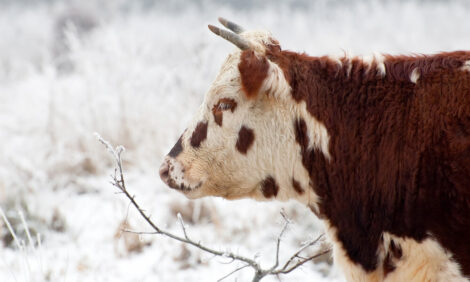



NFUS-Led Group Tests New BVD Strategy
UK - NFUS and a number of associated industry groups met local farmers at Kelso last week to roadtest a new Bovine Viral Diarrhoea (BVD) strategy, which they plan to launch this autumn.
BVD is the most severe virus that commonly affects the Scottish cattle herd and infection from the virus can cause severely reduced physical performance as well as a substantial financial impact on farmers.
The NFUS-led strategy includes a code of BVD risk management for use in both dairy and beef herds and could be the first step towards controlling BVD in Scotland.
Messrs Bryce McCrirrick and Sons of Whitmuirhaugh Farm, Sprouston, Kelso, kindly hosted the event where the following specialists spoke about the elements that make up the strategy:
- Johnny McCrirrick shared his on-farm experience and control strategy along with Robert Anderson of the Merlin Veterinary Group;
- George Calder, SAC St Boswells vet explained the scientific background;
- Basil Lowman, SAC beef specialist spoke about BVD production and cost impacts;
- Nigel Miller, NFUS vice-president and vet spoke about a BVD- free certification scheme that the group is developing.
"A BVD virus outbreak can have a devastating impact on a herd’s fertility and calf crop. Scotland has a reasonably good record on BVD control but it can be difficult to identify the virus and the sellers of breeding cattle may be unaware that they are putting their clients at risk.
“That is why the group is putting together a checklist for vets and farmers of ways to minimise BVD. The strategy is aimed at commercial cattle breeders and provides a template for individual animal, rather than whole-herd testing, as well as vaccination for animals which are BVD-free. In due course, this will provide a pool of animals, which are both free of and immune to the virus.
“The protocols have now been agreed by the groups involved and now we are roadtesting them, with further events planned over the summer.
“The ultimate aim is to have the guidelines published this autumn and to back these up with certificates which can be issued by a vet to a farmer that an animal or herd are disease-free. The certificates could then be held within the passport when selling or buying an animal or group of animals.
“Raising awareness of the disease and working towards its eradication can only be good news. We are grateful to all those who are working together on the issue and look forward to seeing the scheme progress successfully.”
For more information on Bovine Viral Diarrhoea, click here.
TheCattleSite News Desk


